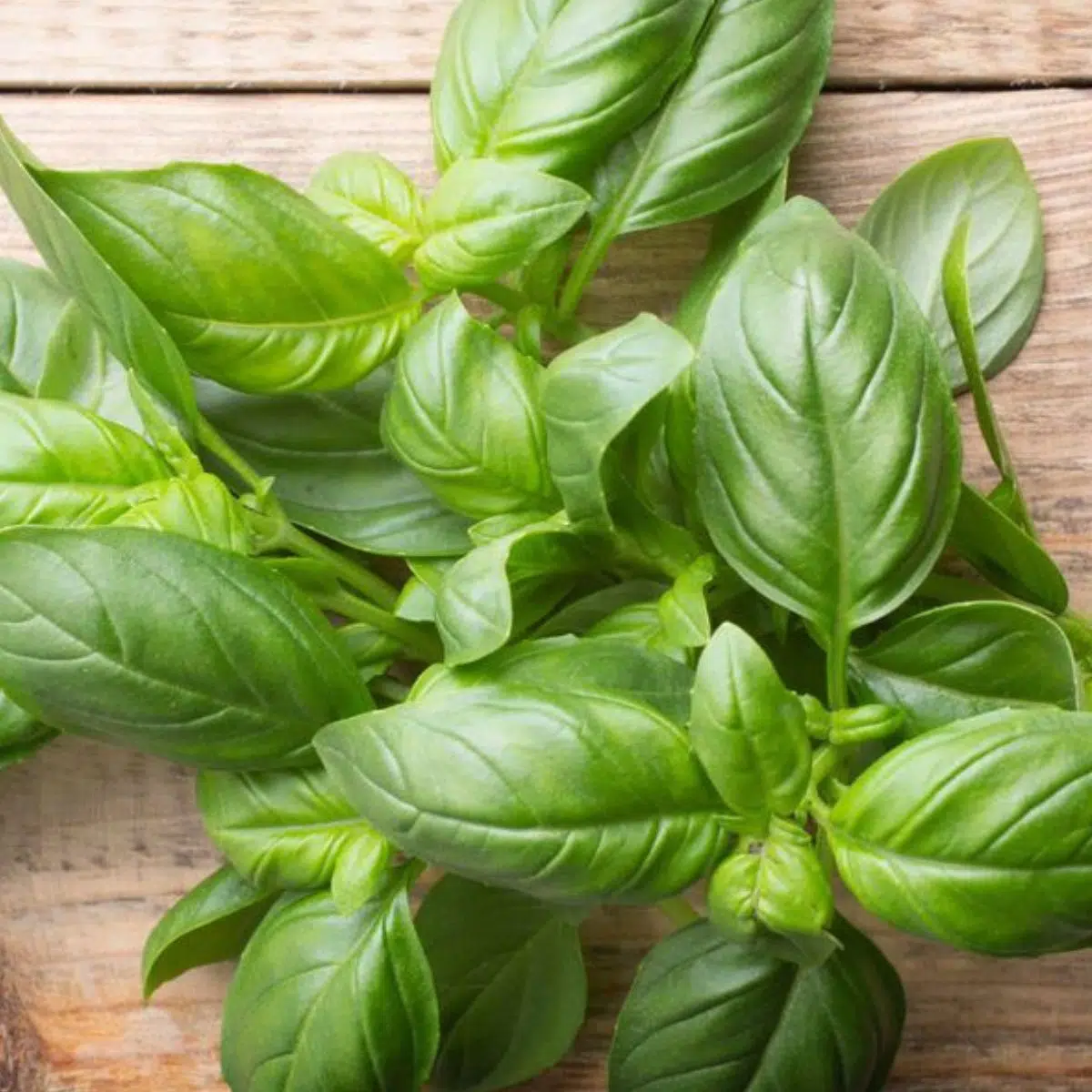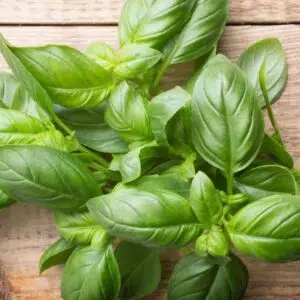A basil substitute will definitely come in handy in the kitchen, especially if your family is a fan of Italian recipes! Fresh and dried basil are common cooking ingredients, and this list features alternatives for both. Don't let your recipe lack flavor, try one of these easy basil substitutes today!
Best Basil Substitutes
There are a few distinct smells that remind us of our favorite foods. Like the fragrant aroma of fresh basil on a pizza. Moreover, the delicious taste that follows these tasty aromas.
While fresh basil is commonly used on top of pizzas and other popular Italian dishes. This herb is also widely used in its dried form, especially in other Mediterranean dishes. The popular choice for basil is that it pairs perfectly with tomatoes and garlic and helps blend other flavors.

Jump to:
- Best Basil Substitutes
- Fresh Basil vs Dried Basil
- 1. Oregano
- 2. Thyme
- 3. Dried Sage
- 4. Italian Seasoning
- 5. Tarragon
- 6. Herbs De Provence
- 7. Poultry Seasoning
- 8. Rosemary
- 9. Fennel Seeds
- 10. Celery Leaves
- 11. Parsley
- 12. Celery Leaves + Fresh Parsley
- 13. Mint
- 14. Spinach
- 15. Arugula
- 16. Cilantro
- 17. Flavored Oil
- 📖 Recipe Card
- 💬 Comments & Reviews
While basil is a favorite, it is not the only flavorful herb to use in these types of dishes. So, if yourself without basil simply reach for one of these great basil substitutes.
Fresh Basil vs Dried Basil
Before jumping into alternate herbs and spices it is worth pointing out that fresh and dried herbs can be used in place of one another. Therefore, if you have a recipe that calls for dried basil you can use fresh basil as a substitute.
Vice versa, you can use dried basil as a substitute for fresh basil. While the look will be different, the flavor will be the same.
However, fresh basil has a less concentrated flavor than dried basil. Therefore, you need to adjust the ratio when swapping one for the other.
Use 3x the amount of fresh basil as a substitute for dried basil: 1 tablespoon in place of 1 teaspoon.
Use ⅓ the amount of dried basil for fresh basil: 1 teaspoon for 1 tablespoon.
1. Oregano
When it comes to Mediterranean and Italian cuisine there is another top herb - oregano. Like basil, oregano is the perfect herb to pair with tomatoes and garlic.
Oregano has a peppery taste that is earthy, bold, and not as sweet as basil. Therefore, it is best used to add depth to heartier dishes with red meat, root vegetables, and rich red sauces.
Use dried oregano in a 1:1 swap for dried basil or fresh oregano in a 1:1 exchange for fresh basil.
2. Thyme
Next to oregano, thyme is one of the best alternatives for basil. It has a similar earthy flavor to both oregano and basil. However, it is not as peppery are oregano.
The milder flavor of thyme makes it an easy substitute for a variety of dishes. It pairs well with heartier and bolder dishes with red meat or red sauces and chicken dishes and salads.
One distinct flavor difference with time is that it has lemony notes. This will add a citrus undertone to your dish. Moreover, if you use too much of this herb the citrus notes can become quite pungent. Therefore, less is better with this herb. Marjoram
Sweet and earthy flavor profile it is a common substitute for other herbs like oregano and thyme. Moreover, it is used in Italian seasoning.
Use ½ the amount of dried or fresh thyme in place of dried or fresh basil respectively.
3. Dried Sage
Sage is another common herb used in Italian cooking. It has a bold earthy flavor that can be used in place of basil in many dishes. However, it has a woodsier flavor with notes of citrus and pine.
While fresh sage can be used in place of fresh basil, it is not the ideal swap. Fresh sage has a coarse texture that is not as easy to cook with. Therefore, it is best to use dried sage in place of dried basil.
To avoid overpowering the dish start with half the measurement. Add more slowly if needed.
4. Italian Seasoning
This seasoning is a blend of all the dried herbs that are commonly used in Italian cooking. Including basil. Therefore, it makes a great substitute.
Alongside basil, you will typically find oregano, rosemary, marjoram, and thyme. Depending on the brand there may also be some dried red pepper flakes.
This beautiful blend of spices is an easy substitute for basil when you want to maintain a bold flavor. However, since it has several other spices it will not be an exact flavor match.
Use ½ a teaspoon of Italian seasoning for 1 teaspoon of dried basil. If your recipe calls for other spices (like thyme and oregano), you can replace all the spices with Italian seasoning if you prefer.
5. Tarragon
Tarragon is an herb often used to season chicken and fish dishes. It is commonly used in French cooking.
Since tarragon is used in French cooking it shares some similar flavor notes with basil. However, while basil is used more for richly flavored tomato sauces, tarragon is typically used with white sauces.
The lighter flavor of tarragon can be a nice swap for basil in dishes with chicken and fish or white sauces. Since it does have its own unique taste, start with ½ teaspoon of dried tarragon in place of 1 teaspoon of dried basil.
6. Herbs De Provence
Herbs De Provence is a spice blend found in French cooking. One of its primary ingredients is tarragon. It also includes thyme, basil, rosemary, tarragon, savory, marjoram, oregano, and bay leaf.
Like tarragon, this spice blend is typically used for poultry and fish. Therefore, it is best used for similar dishes when used as a basil substitute.
As shown above, Herbs de Provence does include basil so you will get some hints of it in your dish. However, the other flavors are more prominent.
Therefore, begin with half the measurement and add more if needed.
7. Poultry Seasoning
This may sound like an odd choice, but poultry seasoning is another great basil alternative for dishes made with chicken and fish.
While it does not contain basil, this blend has several other herbs that are often used as basil substitutes. Including, sage, thyme, marjoram, rosemary, and nutmeg.
Most of these herbs, except nutmeg, share a similar flavor profile to basil. The nutmeg will add a new level of warmth to the flavor of your dish.
This can work well with meat dishes, especially as a dry rub. It may not pair well with tomato-based recipes though.
Use a small amount to begin with (between ⅓ to ½ teaspoon for 1 teaspoon of dried basil). Add more if needed.
8. Rosemary
Rosemary has a distinct aroma and flavor that can elevate various dishes. However, it is especially delicious when used to season roasted chicken or vegetables.
This well-loved herb is included in many spice blends that also use basil. Therefore, it pairs well with many of the same foods.
While it is a great choice to elevate the flavor of a dish it will shift the flavor. So, only use it if you enjoy the bold flavor of rosemary.
Dried rosemary is less pungent than fresh rosemary; therefore, it is a better choice as a substitute. Start with ½ of a teaspoon of dried rosemary to replace 1 teaspoon of basil. Depending on the recipe, you may be able to use more.
9. Fennel Seeds
Fennel seeds have a warm earthy flavor with hints of anise (licorice). When heated up, these seeds create a warm bold flavor.
This substitute is not an exact flavor match for basil, but it can be a nice flavor change. Especially for bold sauces or used to season meat.
A little bit of fennel goes a long way. So, start with ¼ a teaspoon of fennel seeds for 1 teaspoon of dried basil. You may want more, but it is better to go slow with this substitute.
10. Celery Leaves
The feathery green leaves at the top of a stalk of celery can be eaten! Therefore, before chopping them off and tossing them in the garbage, consider using them as a substitute.
Celery leaves have a mild earthy flavor that pairs well with the same Mediterranean fare that basil does. Therefore, it is a great choice for use when you don't have basil on hand. Specifically, for fresh basil.
This can be chopped up, added to a sauce, baked on top of a pizza, or added to a salad. It can even be used in making pesto.
Use chopped in a 1:1 exchange for freshly chopped basil.
11. Parsley
Parsley isn't just a garnish. This leafy green herb is full of flavor that can elevate several dishes.
Since it is milder in flavor compared to some of the other herbs, parsley is great if you are worried you will change the flavor too much. It can be used raw or added to sauces.
12. Celery Leaves + Fresh Parsley
The blend of these two earthy herbs is excellent together. They create a more complex flavor that resembles fresh Italian seasoning.
This mix is a really great fresh basil alternative for all your favorite tomato-based recipes. Mix them in a 50/50 split to equal 1-part fresh basil.
13. Mint
Mint is a well-loved flavor by many people. Moreover, it is a cousin to basil and shares many similar flavor notes.
Fresh mint has a sweeter flavor than basil. It is also one of the sweeter substitutes. Therefore, this is a great choice when you want to enhance the sweetness of a dish.
It can also be paired with an earthier herb to help balance out the flavors in a savory sauce. Start with half of what the recipe calls for in fresh basil and add more if desired.
14. Spinach
Spinach has a similar look to basil with its flat green leaves. However, the flavor of spinach is milder than basil since it is a vegetable and not an herb.
While it won't add the same punch of flavor, chopped spinach is a good option when you need a fresh basil substitute that won't change the flavor of your dish.
It is a great choice for replacing basil in pesto. Especially if you don't enjoy the bold flavor of basil. Simply swap chopped spinach for fresh basil in a 1:1 ratio.
15. Arugula
Arugula has a bolder flavor compared to other leafy greens, like spinach. The bright peppery flavor of arugula is like that of basil.
So, if you want an easy-to-find alternative that has more flavor than spinach, arugula is a great idea. Fresh arugula can be chopped up for pesto or used in salads. It is not ideal for hot recipes though.
Use in a 1:1 ratio.
16. Cilantro
Although fresh cilantro has a lovely and leafy green look that may remind you of basil, the flavor is quite different. Cilantro has a peppery taste that is spicy with underlying citrus notes.
Moreover, a large population of people hate the taste of cilantro. Therefore, it is not at the top of the list for basil substitutes.
However, it can work in certain instances. Use it as a topping for soups or salads or as another garnish. It is also a good alternative to basil in Thai cuisine.
It is best to use cilantro sparingly, or in a manner that is easy to remove from a dish for those who don't like the flavor.
17. Flavored Oil
In addition to the fresh and dried options above, you can use flavored oils as a substitute. If you have basil-infused olive oil or other basil-infused oil, give it a try in a pinch.
This will work best for enhancing the flavor of a sauce or dressing as you can easily mix it in. However, you can also sprinkle a little over the top of a pizza or casserole
The exchange ratio will vary depending on how you are using the oil. Start with a small amount and slowly add more as desired.
Choose a basil substitute from this list and you'll be cooking in no time! Let us know which substitute you think works best in place of basil by leaving us a comment below!
Do you love a recipe you tried? Please leave a 5-star 🌟rating in the recipe card below and/or a review in the comments section further down the page.
Stay in touch with me through social media @ Pinterest, Facebook, Instagram, or Twitter! Subscribe to the newsletter today (no spam, I promise)! Don't forget to tag me when you try one of my recipes!
📖 Recipe Card
Best Basil Substitute: Oregano (+ More Easy Alternatives!)
Ingredients
- 1 tablespoon oregano
- ½ tablespoon Thyme
- ½ tablespoon Sage
(Note: 2x or 3x only changes the ingredient list)
Instructions
- Use dried oregano in a 1:1 swap for dried basil or fresh oregano in a 1:1 exchange for fresh basil.
- Use ½ the amount of dried or fresh thyme in place of dried or fresh basil respectively.
- To avoid overpowering the dish, start with ½ the amount of sage in place of basil. Add more slowly if needed.



Michael Edwards says
There is no mention of Basil mint which I use all the time - also I freeze roughly chopped leaves for winter use. It has a flavour far more in keeping than ordinary mint (spearmint) and is just as easy to grow - I grow mine outside all the year round in pots so it cannot invade the garden as it is rather rampant. So much easier to grow than basil in our UK climate.